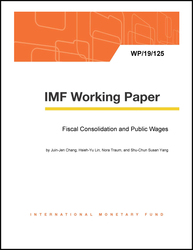
Fiscal Consolidation and Public Wages
A New Keynesian model with government production, public compensation, and unemployment is fit to U.S. data to study the macroeconomic and fiscal effects of public wage reductions. We find that accounting for the type of government spending is crucial for its macroeconomic implications. Although reductions in public wages and government purchases of goods have similar effects on total output and the fiscal balance, the former can raise private output slightly, in contrast to the substantial contractionary effects of the latter. In addition, the baseline estimation finds that exogenous public wage reductions decrease private wages. Model counterfactuals show that sufficiently rigid nominal private wages can reverse the response of private wages, as the rigidity dampens the labor reallocation effect from the public to private sector that exerts downward pressure on private wages.
Publication date: June 2019
ISBN: 9781498316835
$18.00
Add to Cart by clicking price of the language and format you'd like to purchase
Available Languages and Formats
| English |
Prices in red indicate formats that are not yet available but are forthcoming.
Topics covered in this book
This title contains information about the following subjects.
Click on a subject if you would like to see other titles with the same subjects.
public wage , fiscal consolidation , government spending , fiscal policy , New Keynesian model , Bayesian estimation , state and local governments , wage reduction , baseline model , wage rigidity , government compensation , reallocation
Summary
Copyright © 2010 - 2026
Powered by:
AIDC



